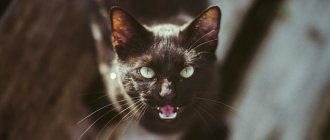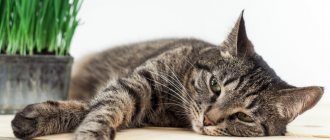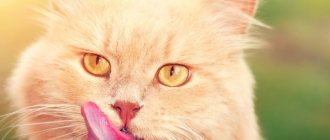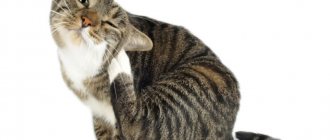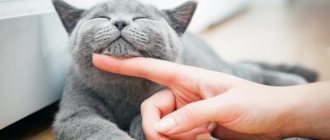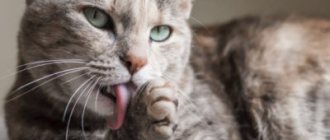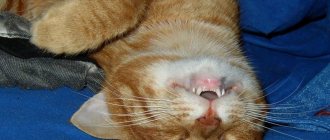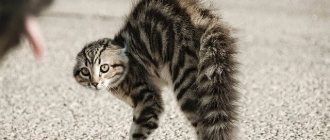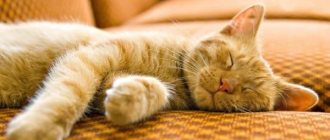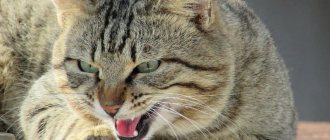Reasons why a cat doesn't eat well
In fact, you shouldn't always panic when your cat doesn't eat anything for a couple of days. Especially in cases where the animal does not look exhausted, does not have a fever, and there are no signs of an upset stomach or other malfunction of the body. The most common reasons why a cat doesn’t eat anything:
- Abrupt transition to new or unusual food.
Cats have their own taste preferences, just like people, so even high-quality food suddenly introduced into the diet can cause food refusal. The owner should always carefully study the composition of the food, the manufacturer’s recommendations for feeding, and remember that the new product is introduced gradually, only being mixed in small quantities with the old one that is familiar to the animal.
This situation can also happen when a cat that is accustomed to industrial food is switched to natural food. It is unlikely that a cat that has eaten dry food will happily eat, for example, vegetables with meat or cottage cheese. But if it’s just a matter of changing the usual diet, then there is no need to worry, the cat is simply not yet accustomed to the innovations in its menu. The animal itself does not look sick; it does not have diarrhea, vomiting, or excessive discharge from the eyes or nose.
Stressful situations.
Cats are sensitive animals; just like people, they can be sad, worried, or afraid of something. In a stressful situation, it may be quite normal to refuse food for a couple of days, feel depressed, and apathy. In this case, it would be a good idea for the owner to first try to find out what is the cause of the animal’s suffering, eliminating it if possible. If the situation cannot be corrected (the death of someone dear to the animal, the appearance of a new pet in the house, etc.), then it will take time and participation in the cat’s life on the part of the owner. You may need to consult a veterinarian, as well as purchase sedatives for purring.
Weather.
When the temperature outside the window exceeds 30 (or even 40) degrees, even the most voracious animal can look for a patch of shade on the street or lie exhausted on the floor, forgetting about food. In such cases, you should not force feed the cat and lament why it refuses to eat. On the hottest days, it is better not to overload the animal’s body, however, clean drinking water at such times is more important than ever.
The owner does not monitor the cleanliness of the animal’s bowls.
Cats are one of the cleanest animals, so the owner should wash all cat dishes after each feeding or at least once a day. Dirty plates, bowls with dried food debris, ants crowding around, and the smell of sour food can make a cat refuse to eat. In addition, neglect of cleanliness can lead to various diseases.
Hormonal surge.
When the animal's body undergoes restructuring during puberty, during estrus and pregnancy in cats, the owner may observe a refusal of food in the pet. During the period of cat spree, animals may not eat for up to a week, especially females. The owner should not worry, since the cat’s appetite will return to normal as soon as the animal calms down, and the problem of hormonal changes will be solved by itself. It may not be superfluous to purchase vitamins depending on your doctor’s recommendations.
Helminthiasis or the presence of external parasites in a cat.
The owner should remember that the presence of worms, as well as external bloodsuckers (most often fleas) can cause many problems for the animal. All parasites multiply at enormous speed, and then with their offspring they feed on the blood of the animal and poison its body with the products of their vital activity. The cat's owner should take preventive measures to ensure that the four-legged friend's body is free of worms and fleas, and also monitor the cleanliness of the room. If the owner suspects that the cat has worms, then the following symptoms will become alarming: diarrhea, cough, vomiting. Fleas can cause the following unpleasant conditions for a cat: poor sleep, thinning fur, itching from bites.
There are many pieces of fur accumulated in the cat's stomach.
In cases where an animal actively licks itself, a large amount of hair accumulates in its stomach. This problem is especially acute when the owner does not comb out the pet’s fur. Vet pharmacies sell special products that prevent the formation of hairballs, which can be purchased by the cat owner. In addition to refusal to eat, this problem is also characterized by stool disorders and vomiting.
What should an owner do if a cat doesn’t eat well?
If the cat feels cheerful and cheerful, has normal bowel movements, and the hunger strike lasts no more than 2 days, then the owner can be calm. It would be a good idea to try to gradually introduce some new foods into the diet, depending on what your cat’s diet is. If the animal eats natural food, then it makes sense to offer it some new but healthy products. If your animal's menu included industrial food, you can purchase a new type - for cats that are picky eaters. But any food should be introduced gradually and the animal should not be forcefully fed.
A good appetite is always considered an indicator of health, so many owners begin to sound the alarm when their beloved pet eats poorly or refuses to eat at all. But refusal to eat is not always a sign of illness or behavioral disorders; sometimes it is a normal condition. You need to learn to understand why the cat does not eat in order to provide the correct help to the cat in time if necessary.
How long can a cat go without eating? What are the dangers of starvation?
These are approximate dates, taking into account that the animal drinks enough these days. Longer fasting or fasting while refusing to drink is dangerous for the life of a pet.
A kitten under 6 months of age can die within 24 hours of fasting, so if the kitten does not eat, it must be force-fed.
In addition to the risk of death, refusing to eat can cause the following health problems:
- severe weight loss;
- exacerbation of any chronic diseases;
- avitaminosis.
Why is it dangerous to overfeed kittens?
As soon as the baby is taken from the mother, as a rule, this happens no earlier than 2.5-3 months, the responsibility for feeding it falls entirely on its owners. Proper nutrition and a balanced diet are the most important factors in the full development of a pet. At the same time, you need to understand that overfeeding is just as dangerous for a growing body as underfeeding.
INTERESTING TO KNOW: What to do if the kitten does not eat or drink
The kitten's stomach is still very small and is not able to process large volumes of food, so it needs to be fed in small portions, but often. However, many owners believe that the more you feed your baby, the better for his growing body. This is a dangerous misconception!
A kitten that systematically overeats develops a large belly, which not only prevents it from moving, but can also paralyze the functioning of the digestive tract. A large and hard belly may also indicate that the baby has stool stagnation (constipation) due to overfeeding, which occurs due to a decrease in physical activity. Such kittens are very lethargic, move with difficulty and sleep a lot.
To normalize the digestion process, it is necessary to urgently adjust the diet: limit the number and volume of feedings, switch to high-quality special food for kittens, introduce a sufficient amount of microelements and vitamins into the diet - if preference is given to natural food, good food already contains nutrients in the quantity required for a growing organism.
And, of course, it is very important to provide the baby with sufficient physical activity.
The main reasons why a cat refuses to eat
- Stress.
- Changing your diet.
- Thermoregulation.
- Sexual instinct.
- Pregnancy.
- Parasites.
- Oral diseases.
- Poisoning.
- Foreign body and fur in the stomach and intestines.
- Viral infection.
- Diseases of the liver, kidneys and urolithiasis.
- Postpartum period.
- Consequences of anesthesia.
Stress
Cats are exposed to stress no less, and perhaps even more than people. Moving to a new place of residence, a new bowl, rearranging the room, renovations, a business trip for the owner, or mood swings of the owner - all these are stressful situations for the animal.
Even the arrival of guests or a quarrel between family members can affect the cat’s well-being.
During stress, the cat is not active, she has an apathetic mood, she does not want to play with the owner, she eats poorly or refuses to eat at all. In such a situation, there is no need to force the animal to eat; refusing food for a couple of days is the norm.
Increased attention to the cat from family members, affectionate treatment, and new toys help in stressful situations. In severe cases, consultation with a veterinarian is necessary, who can prescribe sedatives to the animal.
But be careful: the cause of stress may be the onset of an illness.
Changing your diet
New food is stressful in itself. Cats are very picky eaters and are sensitive to any change in diet. A sudden transition from one type of food to another, or a change in the brand of dry or wet food, can lead to the animal going on a hunger strike.
The animal does not understand that the new food is of better quality and cannot appreciate the efforts of the owner. The cat is accustomed to a certain food, so it declares a “boycott” on any unfamiliar food.
Monitor the condition of the animal; if the cat looks healthy and drinks enough water, then you should not worry too much about such a “hunger strike”.
What is this phenomenon?
If a cat constantly asks for food, then this change in eating behavior is called polyphagia. This is a pathological condition caused by:
- gluttony and stretching of the stomach walls;
- lack of nutrients during the active growth of a young animal;
- the body's reaction to medications;
- stress or prolonged feeling of discomfort;
- cold season;
- decreased metabolism in old age.
- I want to eat.
Polyphagia can develop at any age. If your cat has been eating a lot lately, although this was unusual for him before, the reason should be identified as soon as possible.
Attention! Stressful situations and prolonged lack of appetite subsequently provoke polyphagia in cats. After a hunger strike, they try to make up for the lack of nutrients without feeling full.
When is there nothing to worry about?
All of the listed symptoms of cat gluttony are removable and should not cause concern to owners unless severe exhaustion/obesity, vomiting after eating, or deterioration in the condition of the coat and teeth are observed. Polyphagia can be overcome by properly organizing the feeding of the purring cat.
During the period of active growth and development, which lasts about 2 years, kittens have a great need for nutritious, balanced food. They spend a lot of energy and try to replenish it by eating more than normal. If the kitten eats a lot, grows quickly and remains energetic and playful, then there is nothing to worry about.
Babies need a lot of energy
Peculiarities of eating behavior also depend on the breed, so owners should be aware of their cat’s daily calorie requirement, as well as how this parameter changes depending on the pet’s age.
Female felines may experience an increased appetite after the end of estrus, when they try hard to make up for the lack of calories by eating. During heat, a cat completely loses its appetite due to nervousness, but subsequently they simply eat up, absorbing food in unlimited quantities.
Attention! Older cats show more interest in food than young cats. An active, non-obese pet with a slightly increased appetite should not cause concern.
Why does the kitten eat a lot?
It’s not for nothing that veterinarians strongly advise against taking babies away from their mothers too early. It is advisable that the baby is already 3 months old at that time - this is the best option. If the amount of food consumed by a kitten exceeds the permissible norm, then it is quite possible that the pet lacks some elements contained in mother’s milk.
Among the reasons why a kitten constantly asks for food can be both completely harmless and alarming:
- poor bowel function;
- individual characteristics of nutrient absorption;
- the body's needs during the period of active growth;
- various diseases, for example, diabetes, liver disease;
- use of certain medications;
- climate change (cats eat more in the cold season);
- presence of parasites.
The last reason is perhaps the most common. In this case, the kitten constantly wants to eat, meows pitifully, and screams. He eats a lot, but does not gain weight and has a big belly. With helminthiasis, another clinical picture is possible - the kitten eats little and begins to experience weight loss.
INTERESTING TO KNOW: Why you shouldn’t give kittens cow’s milk
If your cat has parasites, he needs to be given an anthelmintic drug recommended by a specialist. Deworming is carried out twice, again - 10-14 days after the initial treatment.
Pathological causes
There are also pathological reasons why a cat eats a lot and does not get enough, signaling serious changes in the body. This:
- impaired absorption of beneficial components due to congenital characteristics of the body or the presence of serious diseases - inflammation and intestinal cancer, exocrine insufficiency, pancreatic tumors;
- diabetes mellitus, which often affects pets;
- pregnancy and breastfeeding;
- helminthic infestation.
If the cat's constant hunger is not associated with pregnancy and worms, it requires specialized veterinary care. The presence of serious diseases affects the appearance of the animal - the cat eats a lot, but loses weight, becomes capricious, loses interest in active games, and its fur and teeth become unattractive.
It may be worth contacting a veterinarian
As a rule, most diseases respond well to treatment and require a balanced diet using special foods. You can detect the presence of the disease yourself, simply by observing your pet: the fact that the cat is always hungry, drinks a lot and often goes to the toilet indicates diabetes.
Problems with the gastrointestinal tract are indicated by vomiting and diarrhea. Of course, only a doctor can prescribe treatment!
How long should a kitten sleep?
When it comes to sleep, cats are big sleepers. An adult animal sleeps up to 18 hours a day. True, this only applies to pets who do not need to worry about food.
The kitten sleeps even more - up to 20 hours. This is due to the fact that his body is in the process of active development, the cat is gaining weight, spending a lot of energy, to replenish which he needs to eat and, of course, sleep. For example, a two-month-old baby eats 5-6 times a day. After eating, he falls asleep again for 2-3 hours and wakes up due to a feeling of hunger. The period of wakefulness in total takes no more than 4 hours.
The regime may be different - it all depends on the character and habits of the kitten. But in any case, the baby should not sleep less than 18 hours. So there is nothing wrong with the fact that a small pet sleeps a lot; on the contrary, it is well-fed, which means it is healthy.
If something worries you, it is advisable to take your baby to the vet to make sure everything is okay with him. If a specialist discovers any deviations, you need to immediately begin treating the little furry so as not to start the process.
What to do?
If the cat asks to eat more than the norm, then you can:
- change the food to a more expensive and nutritious one. Cheap economy class mixtures do not contain the vitamins, minerals, and biologically active substances necessary for normal growth and development of the animal. Their deficiency in the cat’s body provokes overeating;
- do not feed in excess of the norm, focusing on the instructions for consuming food, the age and physiological characteristics of the cat;
- organize fractional feeding at the same time - 2-3 times a day;
- eliminate unscheduled snacks that are skillfully begged for by cunning manipulative cats.
A pregnant cat must be fed with specially formulated food that contains the full range of essential nutritional components or the diet must be further enriched with vitamins and minerals. As a preventive measure and to get rid of parasites, regularly administer anthelmintic drugs.
Diabetes mellitus and intestinal diseases require diagnosis and drug treatment. You should also contact a veterinarian if, despite all efforts, the cat constantly asks for food, and its appearance leaves much to be desired.
How to feed a kitten correctly
Exactly how much a baby should eat depends on his age. So, for the first two months the cat needs to be fed 5-6 times a day, the daily amount of food should not exceed 150 grams. In the period from 3 months to six months, the cat needs more food - up to 240 grams (four feedings a day).
At 6-9 months, the baby’s diet increases to 250 grams, but you need to feed it no more than 3 times a day.
At 10-12 months, when the period of active growth ends, in order for a cat to lead a normal life, it is enough to receive two feedings a day (morning and evening) with a daily intake of no more than 200 grams.
However, this scheme is not a dogma; it all depends on the individual characteristics of the organism, the breed and the principle of feeding - natural food or specialized feeds, the instructions of which always detail the number of meals and the daily norm.
It should be borne in mind that kittens require more protein, amino acids and some minerals than adult animals. The baby should receive a daily dose of protein - the main building material for the body - in the amount of 30% of the total food.
For the normal functioning of the gastrointestinal tract and the prevention of constipation, the kitten should always have free access to clean, fresh water.
